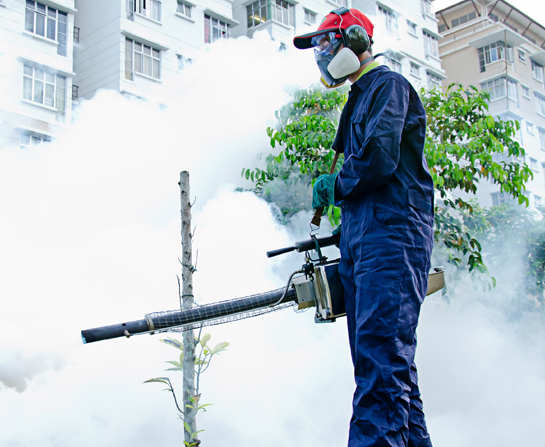Keeping JE Out of Our Lives
April 28, 2022 Return

Keep Mosquitoes Out!
When there is a reported outbreak of Japanese encephalitis (JE) in your neighbourhood, minimising your chances of being bitten by mosquitoes is one way to protect yourselves from the disease.
- Air conditioning can help reduce the chances of being bitten by mosquitoes.
- If you do not have air-conditioning, cover windows and gauze with close-fitting gauze screens to keep mosquitoes out.
- Use aerosol insecticide, electric mats or mosquito coil in the bedroom for added protection.
- If you are travelling outdoors (especially from dusk to dawn, when the Culex mosquito is the most active), wear long-sleeved clothing and socks.
- If possible, avoid going out after dusk. If you have to go out, wear long-sleeved clothing, trousers and socks. You can apply insect repellent on exposed skin.
- If your neighbourhood is infested with mosquitoes, make arrangements for neighbourhood mosquito control programmes (such as spraying) to take place as soon as possible.
Stop mosquitoes from breeding
Mosquitoes breed in areas of still or standing water, so removing these breeding areas would cut down the mosquito population around your home.
- Identify spots around the house that are potential mosquito breeding grounds (gully trap in sinks, air conditioner trays, flower pots, etc) and clean them regularly. Alternatively, you can pour some bleach or insecticide into the water.
- Containers, bowls, plates and other utensils that can collect water should either be covered or turned over when not in use.
- Discard all unwanted water-collecting containers, and always cover your dustbin.
- Keep your house and garden free from clutter and debris.
Get vaccinated
There are vaccinations to protect you from JE, and it is definitely worth giving this shot a shot!
Who should get vaccinated?
The JE vaccine is suitable for adults and children aged 2 months old or above. The following people are recommended by US Centres for Disease Control and Prevention (CDC) to get the vaccine:
Locals
- People who are living in areas known to be JE ‘hot spots’.
- Pig farmers and other people who come into frequent close contact with pigs.
- All laboratory workers.
Travellers
Travellers heading to JE ‘hot spots’ should be aware that certain activities can place them more at risk of catching JE. These activities include:
- Spending a significant amount of time outdoors in rural areas or plantations, especially during the evening or night.
- Taking part in outdoor activities such as camping, hiking, hunting, etc.
- Staying in accommodations that lack air conditioning, bed nets, screens and other means to reduce your chances of being bitten by mosquitoes.
The following travellers should get the JE vaccine:
- Those who intend to spend a month or longer in a destination where JE cases happen all year long.
- For travellers who intend to stay for less than a month, they should still get the vaccine if they plan to travel to rural areas or plantations, or if they intend to carry out the high-risk activities listed above.
- Those heading to a destination that currently experiences a JE outbreak.
- For travellers who are heading to a JE ‘hot spot’, but have not determined what their specific destination, activities or duration of stay, it is better safe than sorry to get the vaccine!
The JE vaccine is not necessary for short-term travellers whose destination is restricted to urban areas, or if there is no well-defined season of JE virus transmission during their visit.
Centers for Disease Control and Prevention. (2010). Japanese encephalitis vaccines: recommendations of the Advisory Commitee on Immunization Practices (ACIP). Morbidity and Mortality Weekly Report, 59, 17-18.
If you like this article, do subscribe here.
